#Tribeamrapali
Explore tagged Tumblr posts
Video
Capture by Namit Dolkar Via Flickr: Gamorous silver gold plated Bahubali Earrings multi jhumki charm drop flower motif earrings Composition: 18K gold plated silver, Fastening: Stud, All our jewellery is handcrafted and therefore variations may occur.
0 notes
Photo

Radhika Madan (@radhikamadan) for Tribe Amrapali (@tribebyamrapali) ♥️📿 #Repost @tribebyamrapali • • • • • • @radhikamadan is a breath of fresh air in our Rewa collection, now available at 10% off on our website. Click the link in the bio to shop now. Picture Credits: @candymag.in #TribeAmrapali #Jewellery #JewelleryLove #FashionJewellery #InstaJewelry #HandcraftedJewellery #JewelryCollection #StylishJewellery #RewaCollection #radhikamadan #radhikamadanofficialapp (at Tribe Amrapali) https://www.instagram.com/p/CBQUo-6pTz_/?igshid=1pt0lejasej3w
#repost#tribeamrapali#jewellery#jewellerylove#fashionjewellery#instajewelry#handcraftedjewellery#jewelrycollection#stylishjewellery#rewacollection#radhikamadan#radhikamadanofficialapp
0 notes
Text
Dazzling Diversity: Exploring the Variety in Indian Jewellery
Introduction:
India, a kaleidoscope of cultures, languages, and traditions, is home to a myriad of jewellery styles that mirror the diversity of the country. Each region boasts its unique designs, materials, and techniques, making Indian jewellery a captivating journey through time and culture. Know more in detail Traditional Earrings

North India: Rich Heritage of Kundan and Polki Jewellery
The northern part of India is renowned for its opulent Kundan and Polki jewellery. Kundan, a traditional form of Indian gemstone jewellery, is characterized by the use of highly refined gold and gemstones. Polki, on the other hand, features uncut diamonds set in intricate patterns. The craftsmanship involved in creating these pieces is meticulous, often requiring hours of labor, resulting in breathtakingly beautiful ornaments that are favored during weddings and grand celebrations.
South India: Temple Jewellery and Intricate Gold Craftsmanship
In contrast, the southern regions of India are celebrated for their temple jewellery and intricate gold craftsmanship. Temple jewellery, inspired by traditional temple motifs, is adorned with depictions of gods and goddesses. The goldsmiths in South India are renowned for their expertise in creating detailed designs, often using filigree work and gold granulation. These pieces are not just accessories; they are considered auspicious and are an integral part of South Indian bridal trousseaus.
East India: Lacquer Work and Terracotta Traditions
Moving towards the eastern part of India, one encounters the unique artistry of lacquer work and terracotta jewellery. Lacquer work involves applying a protective coating to metal surfaces, giving them a distinct, vibrant look. Terracotta jewellery, crafted from baked clay, reflects the earthy and rustic charm of the region. These forms of jewellery are not only aesthetically pleasing but also represent the connection to nature and traditional craftsmanship.
West India: The Magnificence of Thewa and Polished Silver
In the western states of India, particularly Rajasthan, one discovers the grandeur of Thewa jewellery and the beauty of polished silver ornaments. Thewa is a traditional art form where intricately crafted gold sheets are fused onto multicolored glass, creating stunning designs. Polished silver jewellery, often adorned with semi-precious stones, is a popular choice for its affordability and versatility. These forms of jewellery showcase the vibrant and vivacious spirit of the region.
Contemporary Fusion: Blending Tradition with Modern Trends
While traditional jewellery holds immense cultural significance, contemporary Indian designers are creating a fusion of tradition and modernity. The emergence of lightweight jewellery, incorporating materials like alloys and imitation stones, caters to the preferences of a modern, on-the-go lifestyle. This fusion not only enhances the accessibility of Indian jewellery but also allows individuals to express their style while staying connected to their roots.
Global Influence and Recognition:
Indian jewellery has transcended its geographical boundaries and garnered international acclaim. Designers showcasing at global fashion events incorporate Indian elements into their creations, leading to a global appreciation for the artistry and craftsmanship of Indian jewellery. Bollywood celebrities adorned in exquisite Indian jewellery at international events further contribute to its global allure.

Preserving Heritage and Artisanal Skills:
As India continues to modernize, there is a growing awareness of the need to preserve traditional artisanal skills. Government initiatives, NGOs, and private enterprises are working together to promote and sustain the rich heritage of Indian jewellery craftsmanship. This not only ensures the survival of ancient techniques but also provides livelihoods for countless skilled artisans. Know more in detail Tribal Jewellery Online
Conclusion:
In the grand tapestry of Indian jewellery, diversity is the common thread. From the regal Kundan of the north to the earthy terracotta of the east, each piece tells a story of tradition, culture, and artistry. As the jewellery industry continues to evolve, the kaleidoscope of Indian designs will undoubtedly enchant generations to come, ensuring that the legacy of this rich heritage endures through time.
0 notes
Text
The Timeless Elegance: Significance of Indian Jewellery
Introduction:
India, a land rich in cultural diversity and heritage, has a profound history of craftsmanship, and one of the most celebrated aspects of this heritage is Indian jewellery. Renowned for its intricacy, symbolism, and vibrant designs, Indian jewellery holds a significant place in the hearts of people, not just as adornments but as reflections of tradition, status, and artistry. Know more in detail Tribal Necklace

Historical Roots:
The importance of Indian jewellery can be traced back to ancient times, where it played a pivotal role in expressing the cultural identity of different regions. The use of jewellery was not merely ornamental; it was a symbol of social status, wealth, and often held religious significance. The Harappan civilization, dating back to 2500 BCE, is evidence of India's early fascination with jewellery, as archaeological findings reveal various ornaments made of gold, silver, and gemstones.
Symbolism and Rituals:
Indian jewellery is deeply rooted in symbolism, with each piece telling a story or representing a cultural or religious aspect. For example, the 'Mangalsutra,' a sacred necklace worn by married women, symbolizes the bond of marriage and is considered auspicious. Similarly, the 'Maang Tikka' is adorned by brides on their foreheads, signifying the third eye and representing the union of two souls.
Rituals and Celebrations:
The significance of Indian jewellery becomes even more pronounced during festivals and celebrations. Whether it's the elaborate gold jewellery worn during Diwali or the traditional ornaments donned during weddings, jewellery becomes an integral part of these occasions. The exchange of jewellery during weddings is a common practice, symbolizing the union of two families and the beginning of a new chapter in the lives of the couple.
Craftsmanship and Techniques:
The craftsmanship involved in Indian jewellery is unparalleled, with skilled artisans using age-old techniques passed down through generations. Each region boasts its distinctive style, whether it's the intricate filigree work of Rajasthan, the temple jewellery of South India, or the Meenakari enamel work from Jaipur. These techniques not only contribute to the aesthetic appeal but also serve as a testament to the rich cultural diversity of the country.
Evolution in Contemporary Times:
While Indian jewellery has deep-rooted traditions, it has also evolved with time, adapting to changing tastes and fashion trends. Modern designers are blending traditional designs with contemporary styles, creating pieces that appeal to a broader audience. This fusion of traditional and modern elements has given rise to a vibrant and dynamic jewellery industry that caters to diverse preferences.
Economic Significance:
Beyond cultural and personal significance, Indian jewellery holds substantial economic importance. India is one of the world's largest consumers and exporters of gold jewellery. The industry provides employment to a significant number of artisans, craftsmen, and skilled laborers, contributing to the country's economic growth. The gem and jewellery sector also plays a crucial role in earning foreign exchange through exports.

Challenges and Innovations:
While the Indian jewellery industry thrives, it also faces challenges, including rising gold prices and competition from machine-made jewellery. However, artisans and designers are embracing innovation by incorporating technology into their craftsmanship. 3D printing, computer-aided design, and other technological advancements are being employed to enhance precision and create intricate designs. Know more in detail Silver Beads Necklace
Conclusion:
In conclusion, Indian jewellery is more than just an accessory; it is a cultural legacy that transcends time. Its importance lies not only in its aesthetic appeal but also in its deep-rooted symbolism, reflecting the rich tapestry of India's traditions. As the industry continues to evolve, striking a balance between tradition and modernity, Indian jewellery will undoubtedly continue to be cherished and revered, passing down its legacy to generations to come.
0 notes
Text

Traditional Earrings by Tribe Amrapali often feature intricate craftsmanship, reflecting the artistic traditions of different regions in India. These earrings are crafted using various materials, including silver and gold, and may be adorned with gemstones, pearls, or enamel work. The designs often draw inspiration from historical and cultural elements, showcasing a blend of traditional aesthetics with a contemporary touch.
0 notes
Text
Adorned Traditions: The Symbolic Resonance of Jewelry in Indian Matrimony
Within the elaborate canvas of Indian weddings, jewelry holds an irreplaceable role, transcending its aesthetic value to embody cultural heritage, tradition, and spiritual significance. These intricate ornaments aren't just accessories; they're vessels of tradition, encapsulating stories of love, ancestry, and timeless rituals. Know more in detail Navratna Bangle

Cultural Diversity and Craftsmanship: Indian wedding jewelry is a testament to the country's diverse cultural heritage. Whether it's the intricate craftsmanship of Kundan or the vibrant hues of Meenakari, each piece narrates a tale of regional artistry, celebrating the rich tapestry of India's cultural diversity.
Symbolism and Rituals: Beyond their opulent beauty, these adornments carry profound symbolism. The Mangalsutra, representing marital unity, and the delicate Bichua (toe ring), signifying auspicious beginnings, uphold traditions that date back centuries, symbolizing the sacredness of matrimonial bonds.
Beyond the Bride and Groom: While the bride's ensemble is a centerpiece, the groom's accessories also echo heritage and grace. From the Sehra adorning the groom's turban to the regal brooches accentuating his attire, each piece signifies elegance and tradition.
Auspiciousness and Blessings: Indian wedding jewelry isn't merely decorative; it's believed to bring blessings and good fortune. The exchange of jewelry during ceremonies isn't merely a ritual; it's a gesture of bestowing blessings upon the couple, symbolizing prosperity and harmony.
Craftsmanship and Evolution: The craftsmanship in Indian wedding jewelry is a fusion of artistry and legacy. Every piece reflects not just skill but also the evolution of styles and designs, blending traditional motifs with contemporary aesthetics.
Balancing Tradition with Modernity: While steeped in tradition, Indian wedding jewelry evolves to meet modern sensibilities. The fusion of classic designs with modern elements caters to changing preferences, ensuring these treasures remain timeless yet relevant. Know more in detail Banjara Jewellery Online

In Conclusion: Indian wedding jewelry is more than just embellishment; it's a testament to cultural heritage, narrating tales of tradition, love, and familial bonds. These exquisite adornments are not merely symbols of opulence but revered treasures that encapsulate the essence of Indian matrimony, adorning the union of two souls amidst a kaleidoscope of cultural richness and enduring traditions.
0 notes
Text
Cultural Icons: Traversing the Globe through Jewelry Traditions"
Jewelry, beyond its aesthetic charm, serves as a profound expression of cultural heritage and societal values across diverse civilizations worldwide. Each ornament, steeped in history and tradition, encapsulates narratives that transcend time, reflecting the essence of a society’s beliefs, rituals, and identity. Know more in detail Navratna Bangle
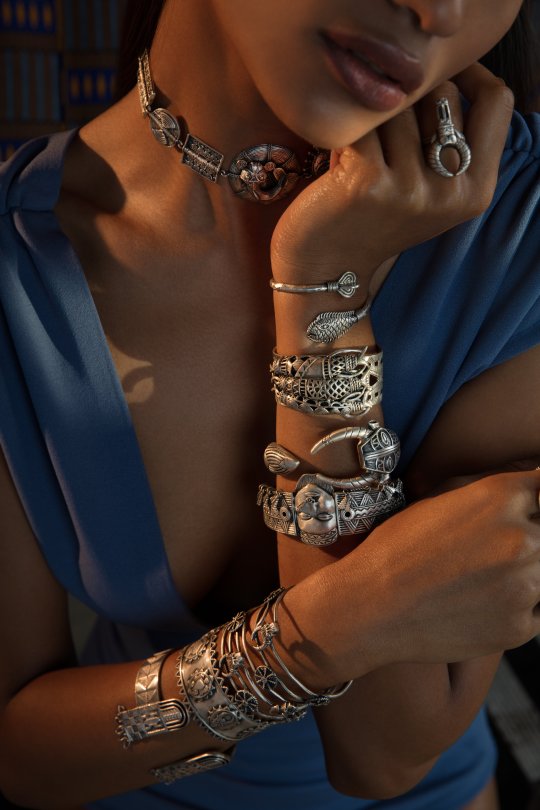
India: Epitome of Tradition and Spiritual Beliefs
In India, jewelry symbolizes more than just adornment; it embodies a deep-rooted cultural legacy. Gold, intricately designed with gemstones, holds immense significance in weddings and festivals. Pieces like the 'nath' (nose ring) or 'baju bandh' (armlet) denote marital status and cultural affiliations, reflecting spirituality and traditions.
Africa: Tributes to Ancestry and Identity
Across diverse African cultures, jewelry is a testament to ancestry and identity. The use of beads, shells, and metals in necklaces, bracelets, and headdresses holds symbolic importance. These adornments, crafted with intricate designs and colors, represent one’s tribe, status, and even stories of bravery and community.
Middle East: Symbolism and Elegance in Islamic Jewelry
The Middle East boasts a rich tapestry of jewelry traditions, blending symbolism with elegance. Intricate patterns in gold, adorned with precious stones, are common. Pieces like the 'hamsa' or 'khamsa' symbolize protection, while calligraphic designs depict verses from the Quran, reflecting religious devotion and cultural heritage.
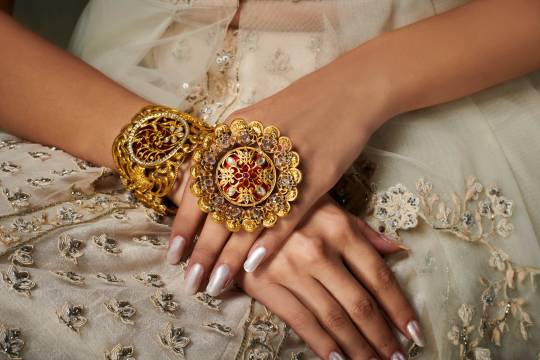
Native American Tribes: Spiritual Connections and Ceremonial Ornaments
For Native American tribes, jewelry embodies spiritual connections and is an integral part of ceremonial attire. Silver, turquoise, and intricate beadwork are prevalent. Pieces like the 'dream catcher' necklace or 'feather' earrings signify spiritual beliefs, tribal affiliations, and stories of resilience passed through generations.
China: Jade's Enduring Symbolism and Cultural Reverence
In Chinese culture, jade holds enduring symbolism and cultural reverence. Jade ornaments, believed to bring luck and longevity, are deeply rooted in tradition. Pieces like the 'bangle' or 'pi disc' symbolize harmony, prosperity, and spiritual balance, serving as cherished heirlooms passed down through families.
Europe: Heritage and Elegance in Time-Honored Designs
European jewelry traditions are a blend of heritage and elegance, influenced by various historical periods. From Renaissance-inspired cameos to Victorian-era lockets, each piece carries historical significance and symbolism. Jewelry like the 'celtic knot' or 'fleur-de-lis' often represents cultural motifs and societal values.
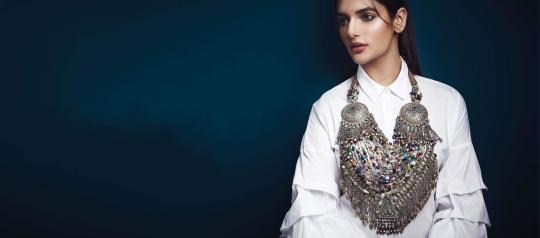
Conclusion: Adornments as Cultural Time Capsules
Jewelry traditions are more than ornamental; they are cultural emissaries, preserving tales of heritage, beliefs, and societal norms. These exquisite adornments serve as custodians of history, each piece narrating stories of resilience, spirituality, and the ever-evolving tapestry of human civilization. Know more in detail Banjara Collection
As we traverse the globe through the lens of jewelry traditions, we unravel the intricate threads of cultural diversity and witness the universal language spoken by these adornments—mirroring the kaleidoscope of humanity's cultural richness and historical legacies.
0 notes
Video
Amrapali Bahubali Collection by Namit Dolkar Via Flickr: Beautifully crafted from the Amrapali Bahubali Collection silver gold plated rawa cluster drop long chain necklace adorned with multi shaped flower motifs.
0 notes
Video
Capture by Namit Dolkar Via Flickr: Beautifully crafted from the Amrapali Bahubali Collection silver gold plated rawa cluster drop long chain necklace adorned with multi shaped flower motifs.
0 notes
Text
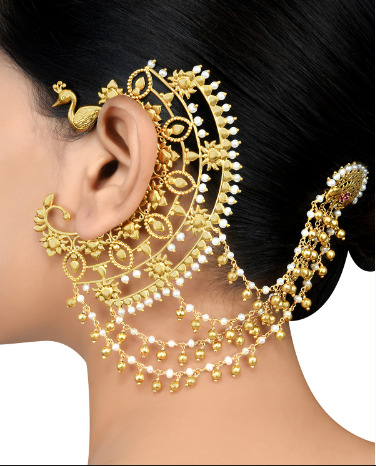
A tribute to the Maratha’s grandeur, these beautiful ear cuffs from Amrapali Manikarnika Collection showcase timeless ethnic style and traditional craftsmanship of a bygone era. These ear cuffs are made from gold plated silver, set with white pink glass and round pearls and adorned with peacock motifs and and hairchain
0 notes
Text
Unveiling Elegance: The Ever-Evolving Tapestry of Wedding Jewelry
Introduction:
Stepping into the realm of wedding jewelry is akin to entering a gallery of timeless elegance and contemporary finesse. The narrative spun by bridal jewelry weaves between traditional opulence and the avant-garde, echoing the sentiments and styles of the times. Let's delve into the enthralling journey of evolving wedding jewelry trends, where classic meets contemporary in a harmonious dance of beauty. Know more in detail Navratna Ring

A Symphony of Timelessness:
At the heart of wedding jewelry lies a perennial fascination with classics, enduring pieces that epitomize grace and sophistication. From the resplendent sheen of pearls to the captivating allure of solitaire diamonds, classic jewelry exudes a timeless charm, a tribute to eternal love and traditions passed down through generations.
Reviving Vintage Grandeur:
Embracing nostalgia, modern brides turn to vintage-inspired jewelry, drawing inspiration from the romantic eras of the past. The intricate designs reminiscent of the Art Deco period or the lavishness of the Victorian age evoke a sense of old-world charm. Adorned in heirloom-inspired pieces, brides relish the romance and sentimentality of bygone times, creating a nostalgic yet contemporary aura.

Contemporary Radiance:
In a shift towards contemporary narratives, modern wedding jewelry stands as an emblem of individuality and innovation. Bold and daring, these pieces feature asymmetrical designs, personalized stackable rings, and unconventional materials, redefining the boundaries of tradition. The contemporary bride seeks jewelry that echoes her unique story, breathing life and modernity into matrimonial ensembles.
Nature's Whispers:
Captivated by the beauty of nature, wedding jewelry embellished with floral motifs emerges as a testament to growth and the promise of new beginnings. Adorned with delicate diamond petals or intricate gold blooms, these designs infuse weddings with the ethereal beauty and symbolism of nature's eternal cycle.
Vibrant Expressions:
Departing from conventional norms, contemporary brides embrace colored gemstones, introducing a vibrant palette into their wedding jewelry. Radiant sapphires, emeralds, and rubies serve as vibrant symbols, representing personal emotions and distinctive personalities within marriage.

Harmonizing Melodies:
Versatility reigns supreme as contemporary brides harmonize metals to create a symphony of elegance in their jewelry. The fusion of gold, silver, and rose gold adorns necklaces and rings, reflecting modern sensibilities and eclectic tastes. This amalgamation of metals resonates with the contemporary bride's desire for adaptability and sophistication. Know more in detail Banjara Jewellery
Conclusion:
The evolution of wedding jewelry is a tapestry woven with threads of tradition and contemporary flair, intertwining stories, and styles. As modern brides delve into this world of opulence, they find themselves drawn to pieces that mirror their unique narratives. Whether enchanted by the timelessness of classics, the romance of vintage, or the audacity of modern designs, each trend adds a distinct chapter to the symphony of love stories. Adorned in jewelry that echoes their inner voices, brides embark on a new chapter, not just in tradition but in the promise of a future enriched by love, style, and limitless possibilities.
0 notes
Text
Trending Tales of Wedding Jewelry: A Modern Journey Through Tradition
Introduction:
The evolution of wedding jewelry remains an enchanting saga, weaving through timeless classics and embracing the avant-garde spirit of contemporary bridal fashion. As brides stride down the aisle, their choice of adornments mirrors a nuanced narrative, fusing heritage with modernity. Let's embark on a captivating expedition through the shifting trends in wedding jewelry. Know more in detail Gold Beads Necklace

A Classic Resonance:
Rooted in tradition, classic wedding jewelry continues to enthrall with its enduring allure. The elegance of pearls, the mesmerizing sparkle of solitaire diamonds, and the sophistication of gold persist as hallmarks of timeless beauty. These pieces, steeped in history and grace, stand as a testament to enduring love and the timeless charm of matrimonial vows.
Reviving Vintage Charms:
In a delightful nod to the past, vintage-inspired wedding jewelry has staged a remarkable comeback in contemporary bridal ensembles. The intricate designs inspired by eras like Art Deco and the opulent motifs from the Victorian era evoke nostalgia and romance. Brides adorned in heirloom-inspired rings and intricate filigree designs revel in the elegance and sentimentality of bygone times.

Contemporary Flair:
The contemporary bride, a symbol of modernity and individuality, seeks wedding jewelry that echoes her unique narrative. Modern pieces exude boldness, featuring asymmetrical earrings, personalized stackable rings, and unconventional materials. These adornments break traditional norms, embodying the dynamism and individuality of today's unions.
Nature's Whispers:
The enchantment of nature finds its way into wedding jewelry with ethereal floral-themed designs. Adorned with the grace of blooming gardens, these pieces symbolize growth, renewal, and the promise of a blossoming union. Whether adorned with delicate diamond petals or intricate gold blooms, these designs infuse weddings with organic beauty and timeless symbolism.
Vivid Expressions:
Steering away from conventional diamonds, contemporary brides embrace colored gemstones in their wedding jewelry. Vibrant sapphires, emeralds, and rubies lend a vibrant hue and personal significance to engagement rings and necklaces. This trend symbolizes the spectrum of emotions within marriage, allowing brides to express their distinctive personalities.

Harmonizing Metals:
Embracing versatility, contemporary brides blend metals to create a symphony of elegance in their jewelry. The fusion of gold, silver, and rose gold adorns necklaces and rings, symbolizing modernity and eclectic tastes. This amalgamation of metals resonates with the contemporary bride's desire for versatility and sophistication. Know more in detail Tribe Amrapali Ghungroo Collection
Conclusion:
The evolution of wedding jewelry is a tapestry woven with threads of tradition, innovation, and personal narratives. Modern brides, equipped with a plethora of choices, adorn themselves with jewelry that reflects their individuality. Whether drawn to the timeless elegance of classics, the romantic nostalgia of vintage pieces, or the audacious statements of contemporary designs, each trend contributes to the mosaic of love stories. Drenched in jewelry that echoes their hearts' whispers, brides embark on a new chapter adorned not just in tradition but also in the promise of a future illuminated by love, style, and boundless possibilities.
0 notes
Text
Traditional vs Modern Jewelry: Embracing Heritage and Contemporary Chic
Jewelry, an art form that spans epochs, has evolved in tandem with human creativity, technology, and cultural shifts. Traditional jewelry, steeped in history and tradition, stands in contrast to the sleek, innovative designs of modern jewelry. In this article, we embark on a journey through the distinct realms of traditional and modern jewelry, unraveling their unique characteristics and the stories they convey. Know more in detail Earrings With Hair Chain

Traditional Jewelry: A Testament to Craftsmanship
Artisanal Excellence
Traditional jewelry bears witness to the skill and artistry of generations of craftsmen and craftswomen. Each piece is meticulously crafted, reflecting the dedication and expertise passed down through the ages.
Symbols of Significance
Steeped in symbolism, traditional jewelry often carries deep cultural meanings. These pieces play a central role in ceremonies, rites of passage, and cultural celebrations, conveying messages of love, protection, and belonging.
Earthly Elements
Traditionally, jewelry was fashioned from materials sourced directly from the earth - metals, gemstones, and natural elements. These pieces not only hold intrinsic value but also carry the essence of the environments from which they originate.
Timeless Appeal
The allure of traditional jewelry transcends fleeting fashion trends. Pieces created decades or even centuries ago continue to captivate with their enduring beauty, showcasing that true elegance stands the test of time.

Modern Jewelry: Where Innovation Meets Expression
Pushing Boundaries
Modern jewelry designers are pioneers of experimentation, exploring a vast array of materials from lab-grown gemstones to unconventional elements like acrylic and titanium. This spirit of exploration expands the horizons of creativity and self-expression.
Contemporary Forms and Functions
Characterized by clean lines, abstract shapes, and innovative compositions, modern jewelry reflects the aesthetics of today. It caters to individuals seeking accessories that resonate with their dynamic, ever-evolving lifestyles.
Personalization and Ethical Choices
Advancements in technology enable unprecedented levels of customization. Individuals can actively participate in the design process, creating pieces that bear their unique imprint. Furthermore, there is a growing emphasis on ethical and sustainable practices, with designers opting for eco-conscious materials and production methods.
A Fusion of Cultures
In our globalized world, modern jewelry often integrates elements from diverse cultures, resulting in pieces that are a synthesis of tradition and contemporary design. This synthesis pays homage to the rich tapestry of global artistic expression.

Harmonizing the Old and the New
Fusion jewelry, an emerging trend, seeks to bridge the gap between traditional and modern styles. These pieces pay homage to the craftsmanship and cultural significance of traditional jewelry while infusing them with a fresh, contemporary spirit. In doing so, fusion jewelry encapsulates the beauty of finding harmony in contrast. Know more in detail Tribe Amrapali Zia Collection
In conclusion, both traditional and modern jewelry offer unique narratives and aesthetic experiences. Traditional pieces honor the legacy of skilled artisans and carry deep cultural symbolism, while modern jewelry embraces innovation, personalization, and contemporary design principles. The emergence of fusion jewelry signifies a beautiful reconciliation of these two worlds, showcasing that they can not only coexist but flourish together in the evolving landscape of jewelry design. Ultimately, the choice between traditional and modern jewelry is a personal one, allowing individuals to curate their own unique tapestry of adornments that reflect their heritage, style, and values.
0 notes
Text
Banjara Jewelry: Embodying Nomadic Grandeur
Banjara jewelry, a living chronicle of tradition and culture, stands as a resplendent emblem of the nomadic ethos of the Banjara community. These exquisite ornaments, steeped in history, not only epitomize a unique aesthetic but also provide a portal into the nomadic lifestyle and heritage of this vibrant group. Know more in detail Navratna Ring
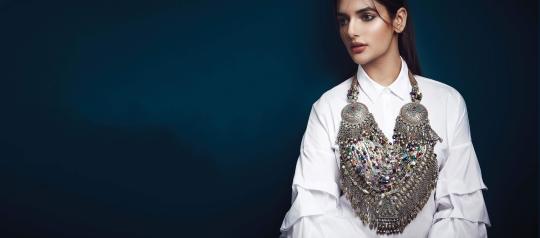
Tracing Centuries of Nomadic Legacy Originating from the arid expanses of Rajasthan, India, the Banjara community boasts a heritage that spans epochs. As natural wanderers, the Banjaras led lives of perpetual movement, embarking on journeys with their families and livestock. This dynamic way of life necessitated ornaments that were not only visually striking but also robust enough to endure the challenges of their nomadic existence.
The Allure of Nomadic Adornment Banjara jewelry is characterized by its bold and lively style. It incorporates an array of elements including coins, beads, shells, and mirrors. These components are meticulously arranged in geometric patterns that not only capture the eye but also carry deep cultural and symbolic significance.
Coins: Emblems of Prosperity and Identity Coins, a prominent feature in Banjara jewelry, served a dual purpose. Beyond their monetary value, they were affixed to garments and accessories as a display of wealth and social standing. Over time, they became an integral part of Banjara jewelry, contributing a distinctive jingling cadence that harmonized with the rhythm of their nomadic lifestyle.
Beads: Guardians of Heritage Beads, sourced from diverse regions, constituted another fundamental element of Banjara jewelry. They were often strung together to form elaborate necklaces, bracelets, and anklets. These beads were not mere embellishments; they carried cultural and spiritual weight, representing the diverse lineage of the Banjaras.
Mirrors: Sentinels Against Negativity Mirrors, an intriguing addition to Banjara jewelry, serve as symbolic protectors against malevolent forces. They are believed to deflect negative energy and safeguard the wearer. Furthermore, they contribute to the resplendent effect of Banjara adornments, capturing and reflecting light in a mesmerizing display.
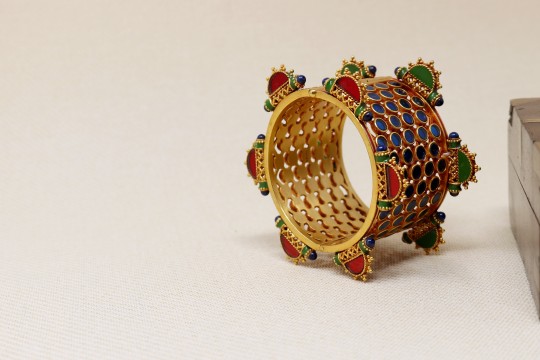
Symbolism Woven in Threads Banjara jewelry is a repository of symbolism, with each piece narrating tales of identity, spirituality, and safeguarding. The 'borla', an iconic headpiece worn by Banjara women, adorned with coins and mirrors, signifies prosperity and wards off negativity. Similarly, the 'timaniya', a choker-like necklace, denotes marital status and is a cherished emblem for married Banjara women.
Preservation and Progress In recent years, concerted efforts have been made to conserve and exalt the legacy of Banjara jewelry. Artisans and designers, recognizing its cultural importance, have incorporated Banjara design elements into contemporary jewelry, thereby introducing this ancient allure to a broader audience.
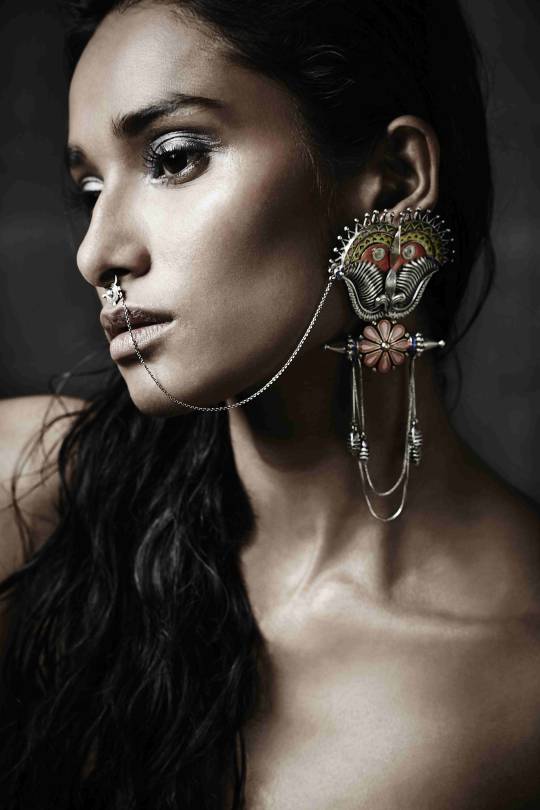
In Conclusion: A Legacy Woven in Jewels Banjara jewelry is not just an assortment of trinkets; it is a legacy woven with threads of history, identity, and artistic expression. It stands as a testament to the ingenuity and creativity of a community that has carried its traditions across epochs and terrains. Know more in detail Tribe Amrapali Zia Collection
As we marvel at the intricate patterns and lively hues of Banjara jewelry, we are invited into a realm of nomadic splendor, where each piece recounts a story and every ornament carries the weight of heritage. In celebrating Banjara jewelry, we pay tribute to the enduring spirit of a community whose legacy continues to radiate through these magnificent creations.
0 notes
Text

Traditional jewelry holds deep cultural and symbolic meaning. It can be worn to signify a person's social status, marital status, religious beliefs, or even as a form of protection against negative forces. It is often reserved for special occasions, ceremonies, and rituals such as weddings, religious festivals, and other significant life events. Overall, traditional jewelry serves as a tangible link to a culture's history, customs, and artistic expressions, making it a cherished and timeless form of adornment. Know more in detail Amrapali Manikarnika Collection
0 notes
Text
Adorning Moments: Traditional Jewellery for Special Occasions
Introduction
Within the tapestry of life, special occasions are the sparkly threads that add color and brilliance to our journey.From wedding ceremonies to milestone celebrations, these occasions deserve to be adorned with jewellery that mirrors their significance.Traditional jewellery, steeped in the past and symbolism, holds a distinctive elegance that transcends time.In this blog, we delve into the realm of traditional jewellery, exploring its role in enhancing the magic of special events. Know more in detail Chandbali Earrings

The Bridal Ensemble: A Symphony of Tradition For brides, their wedding day is a sacred tapestry woven with dreams and aspirations. Traditional jewellery plays a pivotal role in this narrative, adorning the bride with pieces that embody cultural heritage and timeless elegance. Intricate necklaces, resplendent Kundan sets, and ornate Maang Tikkas are carefully chosen to complement the bridal attire, creating a harmonious ensemble that speaks of tradition and love.
Life's milestones, be they wedding anniversaries, birthday celebrations, or graduations, are usually etched within our stories as chapters of triumph and growth.Traditional pieces of jewelry, passed down through several years or chosen with meticulous care, works as a perceptible embodiment of these moments.Heirloom pieces, using their enduring beauty, turn out to be cherished symbols of legacy, hooking up us to our roots and the cherished people who came before us.

Festivals: Embracing the Divine Sparkle Festivals are celebrations of faith, unity, and cultural vibrancy. Traditional jewellery takes center stage during these auspicious occasions, adorning men and women alike in ornaments that reflect their devotion and joy. From vibrant Meenakari earrings to intricately designed Rakhi bracelets, each piece carries a message of faith and festivity, infusing the celebration with an extra layer of grace.
Engagement ceremonies and vow renewals tend to be sacred rites that symbolize the union of two souls.Traditional jewellery serves as a visual representation of this bond, along with rings, pendants, and bracelets exchanged as tokens of commitment.These pieces, frequently chosen with good care, turn out to be constant companions, reminding us of the assurance we've made to each other.These pieces, often chosen with good attention, become constant companions, reminding us of the assurance we've meant to each other.
Coming-of-Age: A Passage into Adulthood For young men and women, the transition into adulthood is a momentous occasion marked by rites of passage. Traditional jewellery, gifted with love and wisdom, accompanies them on this journey. Whether it's a symbolic necklace, a pair of earrings, or a cherished bracelet, these pieces serve as talismans, offering guidance and strength as they step into the next chapter of their lives. Know more in detail Neisha Collection

Conclusion
In the grand tapestry of life, special occasions are the shimmering threads that light up our path. Traditional jewellery, featuring its timeless attraction and ethnic relevance, has the power to elevate these moments, converting them into treasured memories that withstand through decades. Each piece holds with it a story, a traditions, along with a legacy that provides depth and which means to the occasion it adorns. Since we don these ornaments, we carry forward the traditions and values that have shaped us, weaving them into the material of our own lives. In celebrating with standard jewellery, we all not just honor our past but also embrace the promise of the future.
0 notes